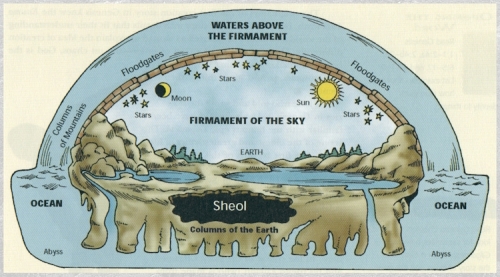
ADVANCE WARNING:The following post is lengthy and should not be read by those with weak intellectual capacity or those with grievously short attention spans. Or if you’re easily offended by provocation of thought or saucy language.
It is my firm belief that I try to give everybody a fair shake, anyone who has read this blog for a while should see that. Sure, I push a few buttons once in a while, but I am (most of the time) categorically respectful—with one glaring exception . . . the stupid.
I shall reiterate my criterion: I have no qualm with those who simply don’t know better, whether through lack of experience or education. My acrimony is freely showered upon the willingly stupid, those whom, at any point, can—and should—take the opportunities to better themselves over gulping down dogma of any sort—but don’t.
One of the most contentious and erstwhile of these are the bleating sheep who, lucky for them, don’t drown in the shallow waters of brainless religion—zealots, non-thinkers, habitual conformers without concern for understanding (or functioning brain stems).
Now, just so I can be sure to offend as many people as possible up front, I share the following placard, not merely for shock value but moreso for its gospel truth:

The following is an important foundational principle of this blog post: A myth can be a duplicitous thing—when standing outside it looking in it clearly is a way for the culture of origin to deal with or understand its environs at the time; when standing inside a myth it becomes something else entirely . . . it becomes divine truth. Myths hide the fact they are myths–they offer a reconciling story. It (mythology) is a way of being human with an existential appeal.
As I mention later, these cultural stories can often be what shape and inform entire communities or peoples, give their lives value and direction. More often they help drive home a deeper ethical, psychological, or symbolic truth which is designed to keep one on the proper path. Myth means ‘sacred story’; it is a way of looking at reality which puts us into that story.
Galileo once wrote “All truths are easy to understand once they are discovered; the point is to discover them.” Discovery takes a willingness to continually ask why, and then question the answer until the proof becomes irreducible. At that point one has a truth which was never really hidden to begin with–it only required our pursuit to fully understand it once we found it.
So, let’s begin, shall we?
Last week I was browsing through my news reader and came across a headline something like this: Christian college taking heat for stance on evolution.
I feel no shame in admitting I am not a scientist, but I very much enjoy—even fascinated by—science. I am grateful that God gave me the capacity to apply a modicum of logic and structured thinking about the world around me. This gift is what gives me the ability to almost instantly recognize morons of any stripe, regardless of their feeble cover or colorful costumes (If in doubt, see my post about the one-quarter of short-bus Americans).
We’ll arrive at the Mythology perspective in a few moments, but first back to the article at issue.
Initially I didn’t read the article because, well, I figured it was an idiot-fest in the making. But the headline festered and like any weakness it kept whispering my name, annoying in the same way eyelashes tangling is irritating or in the way the person seated next to you during mass keeps trying to clear their throat quietly, fooling themselves into thinking no one else can hear.
You know, the kind of things that make you—if for just a passing moment—want to beat the living crap out of somebody.
So, yeah, I caved in, opened the article, and started reading.
This is where the fun begins, kids, so please keep all hands and feet inside the cart while the ride is in motion, and please remember—no flash photography.
I really wish I could begin this with “In a galaxy far, far away . . .” because it would allow me to feel some pity for the distant galaxy. Sadly, we have to share the same piece of galactic real estate with people who can’t draw distinctions between fact and fiction. Enter Stephen Livesay, the president of Bryan College in Dayton, Tennesee, a Christian college.
The picture begins to gel a bit, doesn’t it? The following is copied directly from the article:
“Bryan College’s statement of belief, which professors have to sign as part of their employment contracts, include(s) a 41-word section summing up the institution’s conservative views on creation and evolution, including the statement: “The origin of man was by fiat of God.” “
“But in February, college officials decided that professors had to agree to an additional clarification declaring that Adam and Eve “are historical persons created by God in a special formative act, and not from previously existing life-forms.”
This is where the roller coaster reaches that breathtaking apex and lets you peek over the edge, with slow cruelty, before it begins its stomach churning drop. WEEEEEEEE!
The “statement of belief” is, fairly enough, required of all professors, including those in the sciences, like biology or anthropology. Well, maybe they don’t have anthropology departments—would be utterly unsurprising.
The gentleman in me is willing to let this “origin of man” statement go quietly into that good night. But a gentleman can take only so much before he must emphatically call “Bullshit!”
Sigh . . .
“. . .Adam and Eve “are historical persons created by God in a special formative act, and not from previously existing life-forms.”
Please understand that these six words make my skull ache in a way which begs for imminent explosion to relieve the pain: “Adam and Eve “are historical persons . . .” I want to laugh, truly. I can feel it sticking in my chest. But the urge is efficiently stifled by the potent desire to beat the living crap out of somebody—you know, for just a passing moment. I’d feel guilty about it later . . . unless it was one of these bigots of brainlessness. Then I believe society would throw me a huge f*#$!ng parade; mentally timid conservatives and their ilk are not invited.
Note to mom and dad: not enough people read this blog to warrant any concern of bodily harm. I’m confident that my seven readers are mentally agile, competent folks. I’d be hard pressed to believe any lesser person would have read this far once they saw I was setting out to prove them wrong (see placard above).
Now that the premise is bared, let’s take a moment to consider mythology in its academic context.
The ancient Greeks genuinely believed that Zeus and his cohorts ruled over, judged, most every aspect of their daily lives; ancient Mesopotamians held Marduk to be their true god, having slaughtered the goddess Tiamat and used her body to create the cosmos; in the Carabaulo myth of Timor, eastern Indonesians believed that the first peoples to emerge from the earth’s vagina were aristocrats and that later peoples were commoners, all of them lesser beings to the first emergents.
Are we truly to believe the cosmos is comprised of the dismembered corpse of a Mesopotamian goddess? Or that someone else is better than you just because they crawled out of mother Earth’s holiest-of-holies first (no gentle way to express that)?
To any rational person, the answer is obvious. Disturbingly, an “educator” sees fit to impress his own delusional world view upon the paying student body of Bryan College. This creeps into my dreams; my nightmare is not mine alone—I am boldly confident that many share it.
Lest we allow an appalling diaspora of unibrowed, drooling sock puppets with the mental capacity of concrete to infiltrate our social and communal institutions, misconceptions such as these must be challenged and brought to bear upon an enlightened country teetering frighteningly close to the brink intellectual collapse. Understandably, the argument could be made that we have already crossed that bridge.

For those familiar only with the Genesis account as mother church regurgitates it for the masses, let’s take a slightly closer look at the tool all self-righteous, indignant people like to lean on, the Bible.
The Adam and Eve creation myth (yes, it is a myth—and yes, I’m Catholic) has two accounts—the first from 1:1 to 2:3 and the second from 2:4 to the end of chapter three.The second telling is the more familiar one, recounting the story of Adam and Eve’s betrayal (the Fall) at the Tree of Knowledge and their eventual expulsion from the Garden of Eden. In this account God is immanent, meaning he is manifested, physically present, in the material world—in this case, the Garden of Eden with Adam. In this version Adam is created first from dust and given life through God’s breath—Eve comes later from Adam’s rib.
In the first account God is transcendent, removed/separate from the physical environment and existing far away from the world he created. This is the version where he stirs a vast sea to begin creation (“and the Spirit of God moved upon the waters”), then speaks things into existence (“Then God said “Let there be light”; and there was light”). Here, humans—Adam and Eve—are created at the same time.
The number of similar creation myths worldwide, from various cultures, is stunning. This does not merely suggest but flat out states there is no single, overarching correct perspective of creation, of how we got here. Unless of course you have a single, lengthy eyebrow and breath through your mouth; in such cases your stupidity requires that you desperately clasp onto something that you can’t comprehend but sounds good.
Relevant to this issue are the several types of creation myths or cosmogonies—the word cosmogony itself is a combination of two Greek words meaning “order” and “beginning”:
・Ex nihilo — quite literally, from nothing. A deity may simply speak, think, or dream creation into being.
・Earth Diver — a creature, usually a turtle or bird is sent to the depths of a primordial sea to bring up a piece of mud from which the earth is formed.
・Breaking of Primal Unity — generally parental entities, such as Mother Earth and Father Sky are forcibly separated so that creation may continue; or, a bifurcation of a singular asexual entity which then takes the guise of male and female so as to begin forming the cosmos.
・Dismemberment — usually (although not always) the result of a great battle between deities after which the victor uses the corpse of the conquered to create the cosmos.
・Emergence — creation happens gradually here as human-like creatures typically must traverse several other ‘worlds’ before being truly ready to enter this one.
These are worldwide cosmological mythologies. But creationists, such as Brian Thomas (you’ll meet him in a moment) or Stephen Livesay choose to shut out the rest of the world’s peoples and beliefs in favor of their own misguided convictions. How mind-blowingly ironic that these kind of people comfortably address themselves as “creationists.”
The only sound, most widely accepted version of creation comes to us via hundreds of years of scientific observation. Many of these scientific minds were known to be devoutly religious; rare was the mind which attempted to disprove God. Science was—and is—a process of objective observation and testing. Science gives us proofs which further our understanding of ourselves and our world.
Those matters which we cannot prove—yet still place belief in—are matters of faith . . . not to be construed with actual knowledge.
Both Genesis accounts—along with all manner of other creation myths, and myths in general—give us an apparatus for understanding certain concepts or ideas which otherwise would be complete mysteries to us. In many instances they are etiological, meaning they give us the origins of specific circumstances: the legless serpent we associate with evil, the pain of childbirth (as punishment—along with death—for Eve’s eating of the forbidden fruit), the need for manual labor, to commune with the land for our sustenance (as opposed to pre-betrayal when God tended the garden and Adam luxuriated in its bounty).
Many gods for many cultures have, as part of their own mythologies, created we humans via “special formative acts.” In the Mayan’s Popol Vuh the gods tried creating humans three times and failed, eventually achieving the results they wanted the fourth time around. Were these “historical persons” too?
Greek mythology relates the story of Zeus, so completely fed up with men (and Prometheus) that he sent a catastrophic flood to wipe out men and start over again. The god Prometheus warned his mortal son Deucalion of the flood, and he and his wife, Pyrrha floated in a chest for nine days and nights. When the waters receded enough for the pair to once again walk on firm ground they asked an oracle how to go about repopulating Earth. The oracle told them to “scatter the bones of your mother”–to the Greeks, as with many cultures, Earth is our Mother, and earth is made of stones. So as they walked they picked up stones and tossed them over their shoulder—those which Deucalion tossed became males and those tossed by Pyrrha became females.
Are we to discount the Greek flood account as well because it’s not Christian (or Semitic) in its origin? How about Deucalion and Pyrrha—the Greek analogs for Adam and Eve—are they, too, historical persons?
If you were to pull my finger would I also create a historical person via “special formative act”? Absurd, of course . . . which is entirely my point.
For a moment let’s step across the line (or, if you prefer, step inside this myth) and consider it as if we accepted this ‘divine truth’ that Adam and Eve are “historical persons.”
Historical figures are noted by scholars and students for their part in actual events which surrounded them—they are literally a part of history. So, if the Genesis couple are, in fact, historical figures, then we must also accept that all events—and the subsequent results of those events—are factual as well. One of those events was the expulsion of Adam and Eve from the Garden of Eden for having sinned against God.
The Tree of Life (or Tree of Knowledge) was the only tree in the garden which God forbade Adam to eat of; per Genesis God’s initial intent was for Adam (man) to live forever. Along comes Eve and convinces Adam to partake of the fruit of said tree, resulting in banishment from Eden, along with pain of childbirth for Eve, eventual death for all humans, and the need to toil with the very ground they walked upon for their sustenance.
All these things were brought about by Eve—the Bible doesn’t say Adam suggested she check the fruit out, Eve did it of her own volition.
 Now, for a brief moment, let’s visit a similar myth of Greek persuasion, one which I covered in a blog post some years ago . . .
Now, for a brief moment, let’s visit a similar myth of Greek persuasion, one which I covered in a blog post some years ago . . .
The myth of Pandora begins with Prometheus and Zeus. The king of the gods had decreed that mankind—as Prometheus had recently created—were forbidden to have knowledge of fire. Long story short, Prometheus tried to pull a fast one and snuck fire to his creations hidden in a hollow reed. Zeus caught on when he saw the stars reflecting the light of fire on earth below in human settlements. He was furious. For starters he chained Prometheus to a mountain and sent an eagle to eat his liver every day. Being immortal, Prometheus’s liver would regenerate overnight, and he would suffer the torment all over again the next day.
But this wasn’t good enough for Zeus. He was really pissed. Clearly, it didn’t take an Olympian god to see that mankind was prepared to make all kinds of trouble now that he had fire. Zeus asked another god, Hephaestus, to create a woman. He wanted something evil to befall humans to balance out the gift of fire . . . the way he saw it a woman was just what the doctor ordered. Until Pandora, all humans were male. Hesiod, in his book Theogony, misogynistically refers to the ancient time of life without women as the “Golden Age.” Things were perfect; men ate what they wanted, did what they wanted, had very little to fret over. Life was good.
Zeus had bigger plans.
Now, remember, the pantheon of Greek gods contained goddesses as well—female deities, and these feminine divinities gave to Pandora many a gift for mankind so as to soften the impact of Zeus’s fury. These gifts were carefully placed in an urn, and were not to be released until they could be properly trained by Pandora to benefit humanity.
But Zeus, per usual, had an ace up his sleeve. He gave Pandora a gift of his own—an abiding sense of curiosity
Hardly had Pandora arrived on the earth, when she opened the lid to see what the urn contained. Immediately the creatures in the container flew out, and being as yet untrained to serve humanity they became instead despair, jealousy and rage, and the myriad diseases and infirmities that inflict humanity, All that remained was hope, which became trapped under the unbreakable rim of the urn, and which mankind was able to train and make a friend, as the other ‘gifts’ in the urn had intended to be, though in ways which we cannot now imagine.
*from The Greek And Roman Myths: A Guide To The Classical Stories by Philip Matyszak
Some similarities here: a god/supreme being is angered and seeks to teach humans a lesson; a woman, placed among men for their good, winds up unleashing a bevy of mortal woes upon all mankind because she does something she is expressly told not to do.
So, if we consent to the “historical persons” construct, and as should logically follow, also concede to all events surrounding said persons, then clearly woman is the root cause for all despair, jealousy, rage, diseases and infirmities which the human species must suffer.
It’s all right there, in the Bible! . . . and other world mythological accounts. If Mr. Livesay says these are historical persons then as formal argument demonstrates this becomes a categorical syllogism—the conclusion follows necessarily from the premise of the argument:
・Adam and Eve were (by Livesay dictate) “historical persons,” actual human beings
・Eve (woman) ignored divine rules resulting in expulsion from paradise and subsequent wretchedness
・Therefore all evil in the world is the fault of woman.
I believe God also mandated that women must be perpetually subservient/subjugated to men.
Here’s another interesting bit which speaks to the subjugation (if not indirectly) of woman to man in biblical context: there is but a single—almost non-referential—mention of Noah’s wife in the bible. She is mentioned in Genesis 7:7, but nowhere is she mentioned by name; Noah’s sons wives names are not mentioned either . . . but all males are definitively introduced.
How does that sit with you, ladies? . . . Yeah, I wouldn’t be too jazzed about it either. But again, if you must adhere to the “historical persons” declaration of belief then you have little choice but to accept all which follows.
No, you simply cannot pick-and-choose which things you want to accept. You can’t say the holocaust never happened but, in the same breath, declare your utter disgust for Hitler—the two are inextricably entwined . . . unless of course you were a deluded leader in a theocracy; I won’t name names. And while I’m at it, I’d like to point out that the holocaust was really caused by women, I mean, if you believe Adam and Eve were historical persons then it all points back squarely at Eve.
Need yet more “proof” that Adam and Eve really existed? I thought you might.
Enter a one Brian Thomas, M.S.(Master of Science), who wrote an article posted on the Institute for Creation Research’s website in support of the historical accuracy of Adam and Eve. You’ll see direct quotes followed by translation which seeks to draw aside the veil of ambiguity which Mr. Thomas so artfully weaves in his article.
His premise is, based on actual (ancient) human DNA, Adam and Eve truly existed as real people—and not just real people, but the first people ever!
“However, the evidence supporting Adam and Eve actually overwhelms secularist’s atheistic interpretations of scientific data.”
Here he’s saying the, um, “evidence” which proves the root of our ancestry is so fantastically good that anyone who declares otherwise is full of shit. He goes on to deride genetic research and the human genome stating “the human DNA sequence now best fits the concept of special creation.” This predicated upon the science community’s reliance upon “junk DNA.”
Junk DNA, are, in a basic sense, segments of DNA which have no apparent genetic function; they don’t code proteins nor regulate or encode genetic material. Coded genes are what determine our eye and hair color, etc.
The argument here being that this apparently unused DNA may have been the catalyst for evolution to occur within chimpanzee DNA—meaning, evolution—Nature itself—eventually found a way to use this “junk DNA” to eventually come up with homo sapiens. Mr. Thomas prefers to disregard science (despite his degree) and states:
In other words, without junk DNA as an explanation we must have had Adam, not apes, in our past.
Essentially, if one ignores this non-encoding DNA in our genome (note, he never says it doesn’t exist), if we act as if it’s not really there, then the only plausible explanation for our existence is Adam, not apes.
See, the problem is, this “junk DNA” does exist.
I humbly apologize for the following quote, but it is necessary, the reason for which I’m not entirely certain, but it seems to be . . .
Even more DNA clues strikingly confirm Genesis history. For example, the three fundamental lineages of mitochondrial DNA, called “M,” “N,” and “R,” likely correspond to Noah’s three sons’ wives. These mitochondrial DNA analyses exactly match Genesis 10:32, which says, “These were the families of the sons of Noah, according to their generations, in their nations; and from these the nations were divided on the earth after the flood.” And why else would all men’s Y chromosome sequences—regardless of tongue or tribe—trace back to a single consensus sequence if it were not that of Noah himself, who inherited it from the very real Adam?
 Man, where do I begin?!
Man, where do I begin?!
“Likely correspond”—hmmmm . . . according to other Genesis leaners, I imagine.
This post is long enough so I’ll spare the reader the likely lineage of the biblical flood account, but suffice to say that it is very likely a conflation of a number of far more ancient flood stories as culled from cultural mythologies in the Middle East well before the account of Noah was written. Once again, another great story but not based upon an actual person(s).
Look, after the flood God mandates that Noah, his wife, and his sons and their wives repopulate the earth. He allows Noah to live for something on the order of 600 years. Uh huh. Riiiight. How could someone honestly believe that a flesh-and-blood human being could possibly survive that long without turning into a rather unpleasant puddle of bio-goo?
. . .trace back to a single consensus sequence if it were not that of Noah himself, who inherited it from the very real Adam?
How awesome is that? He follows that up with this juicy morsel:
Surely Christian Colleges’ students would be better served without professors who uncritically align themselves with antiquated secular speculations like junk DNA.
“antiquated secular speculations”—guess we can easily see that Mr. Thomas is clearly better than any of us.
Mr. Thomas goes on to indirectly acknowledge that apes and man share “similar body structures” such as two arms, two hands, and five fingers on each hand and this commonality, according to secular science “clearly illustrates their shared common ancestry.” But it really irks him that something as strikingly similar as appendages gives science a reason to refute the idea of Adam.
Let’s stop here a brief moment . . .
I think science readily accepts the “idea” of Adam, the concept of a primary instance or occurrence of the human species—I certainly do. At some point along the (sorry Mr. Thomas, et al.) timeline of evolution, well before Lucy, there irrefutably was a creature with a brain better than anything around him or her which walked upright and began using simple observation and reasoning to take abstract concepts like sticks or rocks and develop the logic to use them as tools. I believe science would embrace naming such a creature “Adam,” and it would be fitting.
He continues—
“But this logic simply ignores the possibility that a single, smart engineer could have crafted similar design features in different creatures.”
Engineering, at a bare minimum, mandates the application of several fields of science. So, Brian blasts science for it’s supposed flawed approach to man’s evolution but cries out in his desire for us to embrace a “single, smart engineer.”
Then he decries evolutionists who “almost never discuss the insurmountable differences between humans and chimpanzees, like their 900 million DNA differences.”
According to this article in National Geographic (a highly reputable publication), Mr. Thomas’s boat has at least a couple of leaks.
First, while they note there are—as Mr. Thomas states—millions of genetic differences, there are “40 million differences among three billion molecules.” That’s an exponential disparity from our Creation Wizard—a gap of 860 million; exaggeration, be thy name. The article further elaborates . . .
The vast majority of those differences are not biologically significant, but researchers were able to identify a couple thousand differences that are potentially important to the evolution of the human lineage. “The goal is to answer the basic question: What makes us humans?”
Notice, no aspiration to disprove God, nor, likewise, to prove Adam through rose-colored glasses.
Furthermore we learn “2.7 percent of the genetic difference between humans and chimps are duplications . . .” Not a staggering amount, but notable. “Eichler and his colleagues found that the human and chimp sequences differ by only 1.2 percent in terms of single-nucleotide changes to the genetic code.”
This points to a studied, tested, observable process, not a wild, straw-grasping attempt to explicate religion and affix it as doctrinal fact in the social consciousness.
Humans and chimps originate from a common ancestor, and scientists believe they diverged some six million years ago.
Whoa! Seriously? Six million, not six thousand? Who’da thunk it?
Science, Mr. Thomas, via sequencing of the chimpanzee genome, has determined that man and ape are 96 percent alike. You can take the remaining four percent and call it your own but the numbers are clearly not in your (stunted) favor.
Back to Mr. Thomas’s article . . .
Atheistic, and sadly even Christian, secularists have also asserted that we could not have descended from Adam and Eve in only 6,000 years because this is not nearly enough time for mutations to have added the many DNA differences found throughout all peoples. However, this straw-man argument assumes that God did not build a host of variations into Adam’s chromosomes right from the start. Clearly not all DNA differences between people arose through mutation. What if most of them were created for God’s purpose of watching human diversity unfold through the ages as they filled His world?
Sadly, too many idiots believe the Earth has been around for only 6,000 years—some adherents to this empty-headed belief have the gall to call themselves scientists . . . well, at least one of them does. More depressingly, teaching this to impressionable minds is sanctioned in some places.
Once again, science proves, in numerous ways, that our home has been here for billions of years. The Bible doesn’t mention dinosaurs, but we have abundant fossil evidence of their existence—and they came before man . . . or, Adam, if you prefer.
And something else—civilization, as we know it, may have been around—maybe—6,000 years; civilization being defined as the organized and structured use of agriculture, building, forms of rule (typically aristocracy in the early going), and development of written communication. None of these things appeared simultaneously along with man, nor did they happen within a couple hundred years of Adam showing up. Of necessity they evolved—hey, whaddya know! Just like us!
Now we come (sort of) full circle to the reason behind Mr. Thomas’s lame attempt at comedy (although a strained scholarly one, I’ll give him that): his full-throated support for Bryan College’s “clarification” statement . . .
So, there’s no scientific reason to reject Adam and Eve. Perhaps if the dissenting Bryan College professors had more exposure to the recent, high quality science that confirms biblical creation, they would have applauded the trustee’s wording changes.
Jaw-droppingly brilliant . . . and thoroughly entertaining—“no scientific reason to reject Adam and Eve”; “more exposure to the recent, high quality science that confirms biblical creation.”
So, again, the creationists not only see fit but find religious mandate in declaring all other accounts of creation null and void, pointless, erroneous. China’s Pan Ku, the Norse tale surrounding Ysmir, the Navajo’s insect people, Egypt’s Geb (Earth) and Nut (Sky) , ancient Mesopotamia’s Marduk, and countless others. Rather than allowing for these cultural mythologies to serve their intended purpose as vehicles for deeper lessons the creationists—mind you, Christian creationists—hereby declare that their collective shit doesn’t stink . . . but all others do.
Why? Because if they concede to other creation accounts they would, as a moral imperative, necessarily concede that their own creation story is just that—a story. That just won’t do. As history constantly reminds us, religion has always been, is now, and ever shall be a means for repression and attempts at subjugation . . . based upon beliefs. Think I’m out of line? Consider radical Islam or pogroms against the Jews.
Some of the students at Bryan College were concerned enough about the “belief clarification” that they circulated a petition requesting the amended statement be rescinded and returned to its original form. But Kevin Clauson, Professor of Politics and Justice at Bryan College, wrote a letter to the student newspaper, the Triangle, urging students not to sign the petition. He said the wider culture is waging a battle for the “heart and soul” of evangelical higher education.
“If an Evangelical Christian college wants to remain such, it must of necessity limit ‘academic freedom’ to some extent,” he wrote. “This is more or less done through doctrinal statements that must be subscribed to. If the attitude was “believe whatever you wish–anything”, then there would be no way to guard the institution against error or even heresy.”
A little too late to guard against error, methinks.
Every person should, must, hold precious their own beliefs, many of which give our lives form and value, and many of which help keep our internal moral compass properly directed. Likewise, if you wish to do harm to yourself, or harbor delusory notions, then knock yourself out—but do no harm to those around you.
To forcibly impress fallacious reasoning upon the unwilling is not a truly Christian trait, no matter how one spins it. And it is, I daresay, but a hop, skip, and a jump from criminal to mandate professors subscribe to such fallacious declarations as a requisite for their very jobs. Sure, this is America and they could look for a job elsewhere if they don’t like it . . . that’s what’s called a rationalization.
Mr. Livesay has no love for science and would seem to fervently believe we are still in the Dark Ages (which, I understand, would require a true comprehension of time and history, both of which Mr. Livesay has demonstrably ignored). “Scripture always rises above anything else,” Livesay has said according to an online podcast of the clarification event. “Scripture rises above science. … Science at some point will catch up with the scripture.”
Oh, Mr. Livesay . . . just an FYI: all humans are created via a special formative act. Including you.
God, grant me the serenity to accept the things I cannot change…The courage to change the things I can…And wisdom to know the difference…And sedation in the presence of morons.
I cannot change the minds of morons, but I steadfastly refuse to accept their word for the sake of serenity, for how could I peacefully live with myself if I did?
The following scriptural reference is not only apt but puts a nice, vitriolic tourniquet around this post:
“For we wrestle not against flesh and blood, but against principalities, against powers, against the rulers of the darkness of this world, against spiritual wickedness in high places.” Ephesians 6:12














